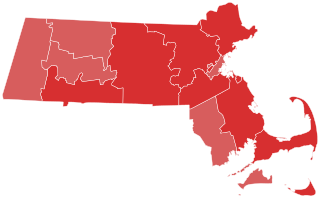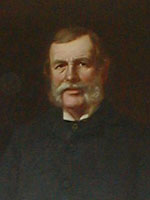
The 1912–13 United States Senate elections were held on various dates in various states. They were the last U.S. Senate elections before the ratification of the Seventeenth Amendment in 1913, establishing direct elections for all Senate seats. Senators had been primarily chosen by state legislatures. Senators were elected over a wide range of time throughout 1912 and 1913, and a seat may have been filled months late or remained vacant due to legislative deadlock. Some states elected their senators directly even before passage of Seventeenth Amendment. Oregon pioneered direct election and experimented with different measures over several years until it succeeded in 1907. Soon after, Nebraska followed suit and laid the foundation for other states to adopt measures reflecting the people's will. By 1912, as many as 29 states elected senators either as nominees of their party's primary or in conjunction with a general election.

The 1994 Massachusetts gubernatorial election was held on November 8, 1994. Incumbent Republican governor Bill Weld won reelection as Governor of Massachusetts by the largest margin in state history, winning every single county and all but 6 of the state's 351 municipalities. As of 2024, this is the most recent election in which Boston, Somerville, Lawrence, Chelsea, Brookline, Northampton, Provincetown, Monterey, Great Barrington, Ashfield, Williamstown, Williamsburg, Shelburne, Sunderland, and Pelham voted for the Republican candidate for governor.

The 1990 Massachusetts gubernatorial election was held on November 6, 1990. Incumbent Democratic governor Michael Dukakis, his party's nominee for president in 1988, opted to not seek a fourth term. Republican Bill Weld won the open seat, beating Democrat John Silber to become the first Republican governor of Massachusetts elected since 1970. This was the first open-seat gubernatorial election in Massachusetts since 1960.

Henry Joseph Gardner was the 23rd Governor of Massachusetts, serving from 1855 to 1858. Gardner, a Know Nothing, was elected governor as part of the sweeping victory of Know Nothing candidates in the Massachusetts elections of 1854.

The Vermont Senate is the upper house of the Vermont General Assembly, the state legislature of the U.S. state of Vermont. The senate consists of 30 members elected from multi-member districts. Each senator represents at least 20,300 citizens. Senators are elected to two-year terms and there is no limit to the number of terms that a senator may serve.
The Massachusetts Republican Party (MassGOP) is the Massachusetts branch of the U.S. Republican Party.
The Bush-Davis-Walker family is a political family from the United States that includes former Presidents George H. W. Bush and George W. Bush. The family's political involvement spans the period from 18th to the 21st centuries.

The 1960 Massachusetts gubernatorial election was held on November 8, 1960. John A. Volpe was elected Governor of Massachusetts to replace Foster Furcolo. Volpe defeated Democrat Joseph D. Ward in the race. Also running were Henning A. Blomen of the Socialist Labor Party of America and Guy S. Williams of the Prohibition Party.
The 1855 United States Senate special election in Massachusetts was held during January 1855. Henry Wilson was elected to fill the remainder of the term left vacant by the resignation of Edward Everett.
The 1877 United States Senate election in Massachusetts was held in January 1877. Incumbent Republican Senator George S. Boutwell, who had won a special election for the remainder of Henry Wilson's term, was defeated by reformist U.S. Representative George Frisbie Hoar.

The 1895 New Jersey gubernatorial election was held on November 5, 1895. Republican nominee John W. Griggs defeated Democratic nominee Alexander T. McGill with 52.28% of the vote.

The 1913 Massachusetts gubernatorial election took place on November 4, 1913. Democratic Lieutenant Governor David I. Walsh defeated the Progressive, Republican and independent candidates Charles S. Bird, Representative Augustus Peabody Gardner and incumbent Governor Eugene Foss with 39.77% of the vote. Suffolk County was the only county to give more than 50% of its vote to a candidate and had given Walsh 53.98% of its vote.

The 1854 Massachusetts gubernatorial election was held on November 15. American Party candidate Henry J. Gardner was elected to his first term as governor, defeating incumbent Whig governor Emory Washburn.

The 1856 Massachusetts gubernatorial election on November 4. Incumbent Know-Nothing governor Henry J. Gardner was re-elected to a third term. He benefited greatly from a deal with the state's new Republican Party, which agreed not to field a candidate in exchange for Gardner's support of presidential nominee John C. Frémont. With no serious challenger in the field against him, Gardner easily defeated Democrat Erasmus Beach and George W. Gordon, an American Party member running in support of the national ticket.

The 1857 Massachusetts gubernatorial election was held on November 3. Incumbent Know-Nothing governor Henry J. Gardner ran for a fourth term in office, but lost the support of the Republican Party, which nominated Speaker of the United States House of Representatives Nathaniel P. Banks. Banks prevailed over Gardner to become the first Republican governor of Massachusetts.

The 1858 Massachusetts gubernatorial election was held on November 2. Incumbent Republican governor Nathaniel Banks was easily re-elected to a second term in office, beginning a period of Republican dominance which would extended into the 1870s.

The 1860 Massachusetts gubernatorial election was held on November 6. Incumbent Republican governor Nathaniel Banks did not run for re-election to a fourth term. He was succeeded by Republican John Albion Andrew, a radical abolitionist.

The 1886 Massachusetts gubernatorial election was held on November 2, 1886. Incumbent Republican governor George D. Robinson did not run for re-election to a fourth term in office. He was succeeded by his lieutenant governor Oliver Ames, who defeated Democratic former state senator John F. Andrew.

The 1874 Massachusetts gubernatorial election was held on November 3, 1874. Republican acting Governor Thomas Talbot, who took office after the resignation of William B. Washburn, was defeated by Democrat William Gaston, a former Mayor of Boston.

The 1853–54 Massachusetts gubernatorial election consisted of an initial popular held on November 14, 1853, which was followed by a legislative vote that was conducted on January 9, 1854, which elected Whig Party nominee Emory Washburn. The ultimate task of electing the governor had been placed before the Massachusetts General Court because no candidate received the majority of the vote required for a candidate to be elected through the popular election.




















